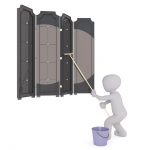Back to: Business Expenses
It’s important to claim allowable business expenses from your profits to minimise your tax bill but within the rules!
Warning: Tax is your personal responsibility and the rules on business expenses can be complex and change over time. This lesson provides an overview of allowable and non-allowable expenses but talk to accountant or the taxman if you have any specific questions about what you can, or cannot, claim.
You can deduct, from your profits, all you spend for the sole purpose of earning business profits.
You cannot deduct anything that you spend for non-business purposes like:
- Premiums on personal insurance policies,
- Income Tax,
- Personal NICs.
What you spend the money on will affect the tax relief you get for that deduction.
HMRC have produced a great site for self-employed tax – see it here at HMRC Tax Guide
 Allowable business expenses
Allowable business expenses
Simply, an allowable business expense is money spent on the day-to-day running costs of your business. This can include:
- Rent, lighting and heating of business premises.
- Telephone and other services,
- Running costs of vehicles used for the business.
Simplified expenses
To make it easier for small and simple businesses, HMRC has a system called ‘simplified expenses’.
Who can use ‘simplified expenses’
Simplified expenses can be used by:
- sole traders
- business partnerships that have no companies as partners
Simplified expenses can’t be used by limited companies or business partnerships involving a limited company.
Types of expenses
You can use flat rates for:
- business costs for vehicles
- working from home
- living in your business premises
You must calculate all other expenses by working out the actual costs.
How to use simplified expenses
- Record your business miles for vehicles, hours you work at home and how many people live at your business premises over the year.
- At the end of the tax year use the flat rates to work out your expenses.
- Include these amounts in the total for your expenses in your Self Assessment tax return.
Private expenses
Where expenses relate to both business and private use, only the business part is allowable.
For example, and if you work from home, you must apportion your bills to private and business use and then claim only the business element.
The two lessons that follow cover how you might deal with motoring expenses and capital expenditure (Capital expenditure is the money you spend on items you would expect to last several years).
The table below provides some guidance on the allowable and non-allowable expenses you might consider.
| Type | Non-Allowable | Allowable |
| Cost of goods bought for resale or goods used | Cost of goods or materials bought for private use, depreciation of equipment | Cost of goods bought for resale, raw materials, cost of producing goods sold, adjustments for opening and closing amounts of stock including stuff in build, commissions payable, discounts given to customers. |
| Car, van and travel expenses | Non-business motoring costs, fines, cost of buying vehicles, travel costs between home and work. | Vehicle insurance, repairs, servicing, fuel, parking, hire, vehicle tax, motoring organisation membership, train, bus air, taxi fares and hotel bills and overnight meals on business trips. |
| Wages, salaries and other staff costs | Own wages and payments, NIC and payments made for non-business work. | Salaries, wages, bonuses, pensions and benefits for employees, agency fees, subcontractor labour costs, employer’s NIC. |
| Rent, rates, power and insurance costs | Costs of any non-business part of the premises, costs of buying business premises. | Rent for business premises, business and water rates, light, heat, power, property insurance, security, use of home as an office (proportion only). |
| Repairs and renewals property or equipment | Repairs of non-business parts of a premises or equipment, costs of improving or altering premises. | Repairs and maintenance of business premises and equipment, renewals of small tools and items of equipment. |
| Accountancy, legal and other professional services | Legal costs of buying property and large items of equipment, costs of settling tax disputes and fines for law-breaking. | Accountants, solicitors and other professional services fees, professional indemnity insurance premiums, trade or professional journals and certain subscriptions. |
| Interest on bank loans, credit card and other financial charges | Repayment of loans or overdrafts or finance arrangements. | Interest on bank or other business loans, overdraft and credit charges, hire purchase interest and leasing payments. |
| Phone, fax, stationary, internet, and other office costs | Non-business private use of any shared services, computer hardware or other equipment costs. | Telephone, fax, internet, postage, stationary, printing and other small office equipment costs including software. |
| Other business expenses | Payments to clubs, charities, political parties, costs of ordinary clothing. Entertaining clients, suppliers, customers, family and friends. | Protective clothing, advertising, mail-shots, free samples, website costs. |
This is not an exhaustive list – check out https://www.gov.uk/expenses-if-youre-self-employed if in doubt ask a small local accountant or phone the HMRC with a specific question(s).
Using the Flat Rate system if you work from home
 You may be able to claim a proportion of your costs for things like:
You may be able to claim a proportion of your costs for things like:
- Heating
- Electricity
- Council Tax
- mortgage interest or rent
- internet and telephone use
You’ll need to find a reasonable method of dividing your costs, eg by the number of rooms you use for business or the amount of time you spend working from home.
Example
- You have 4 rooms in your home, one of which you use only as an office.
- Your electricity bill for the year is £400. Assuming all the rooms in your home use equal amounts of electricity, you can claim £100 as allowable expenses (£400 divided by 4).
- If you worked only one day a week from home, you could claim £14.29 as allowable expenses (£100 divided by 7).
The methods for vehicle mileage are covered in the next lesson.
What expenses regime is best for me?
Use the simplified expenses checker to compare what you can claim using simplified expenses with what you can claim by working out the actual costs. This will help you work out if simplified expenses suits your business.
Finally, the definitive guide for expenses is the HMRC guide!